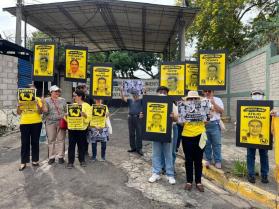Legislature Orders Judges Over 60 Into Retirement, Violating International Law and Hindering Judicial Independence
Since May 1, 2021, El Salvador’s judicial branch has undergone a series of radical changes that violate the institution’s independence as branch of government and subject it to the interests of President Nayib Bukele.
One of the first actions of the “Cyan Bench,” as the deputies of the ruling New Ideas faction call themselves, referring to their party color (teal), was to unseat the five magistrates of the Constitutional Chamber of the Supreme Court of Justice as well as the Attorney General. Many experts considered these removals, made in a midnight vote on May 1, the legislators' first day in office, a move by Bukele to consolidate control over the three branches of government; however, ousting the magistrates was only a first step.
On September 10, amid complaints of arbitrary dismissals throughout central government offices and the Legislative Assembly, President Bukele ratified a reform approved by the legislature that forced judges sixty years of age or older or with thirty years of service to retire. The measure, which ultimately ousted a third of the country’s judges in one fell swoop, was established by amending Article 3 of the Judicial Careers Law, which now reads: “The exercise of the function of Magistrates and Judges shall cease, in a mandatory manner, when the persons who exercise said positions reach sixty years of age, which implies the cessation of the official in his position...”
Notably, however, this new rule was not applied to all judges; the reform excludes the new magistrates of the Supreme Court of Justice who were unconstitutionally appointed on May 1 by the New Ideas-controlled legislature. This exception demonstrates that the administration's intention is to remove senior judges who have been critical of the government’s abuses.
Among the judges forcibly retired by the reform is the Judge of San Francisco Gotera, Jorge Guzmán, who reopened the case of the El Mozote massacre in 2017, one year after the Constitutional Chamber declared the 1993 Amnesty Law unconstitutional. Guzmán has had several public clashes with the Bukele administration and with military officials given that the government continues to deny access to military archives that could substantiate the testimonies of victims and bring justice to victims of the brutal crime.
Similarly, Judges Samuel Lizama and Cesia Romero, who belonged to the Santa Tecla Environmental Chamber and who earlier this year ruled in favor of Indigenous communities and environmental groups who opposed the construction of another dam in the basin of the Sensunapán River, were also forced out. Members of the Roundtable for the Sustainability of the Sonsonate Territories (MESUTSO) have expressed alarm about the reform, urging the government to guarantee environmental justice and respect judicial independence.
Additionally, the ruling majority in the legislature left the door open to reinstate select judges over sixty years old who support the government and who have signaled agreement with its actions, regardless of whether they abide by the law. This is established in Article 4 of the reforms, which reads: “Notwithstanding the foregoing, the Magistrate or Judge who has ended his official functions may remain available in the system, if he expressly consents, and the Supreme Court of Justice may, according to its own reasons, determine the possibility that he may continue to practice in a certain judicial seat, attending to reasons of necessity or specialty of the matter at hand.”
These reforms, in addition to having a clear political objective, also conflict with the notion of independence of powers, break with the spirit of reforms achieved through the 1992 Peace Accords, and contradict Article 186 of the Constitution, which establishes that “the law shall ensure judges’ protection so that they may exercise their functions freely, impartially, and without any influence on the matters they hear, as well as the means to guarantee fair remuneration at a level appropriate to the responsibility of their positions.”
On September 22, the Family Chamber of the Eastern Branch of San Miguel, an intermediate-level court that is second only to the Civil Chamber of the Supreme Court of Justice in terms of authority, admitted a request for precautionary measures against the Legislative Assembly, the President of the Republic, and the Supreme Court of Justice that would render the reforms null. The Family Chamber agreed that the reforms violated human rights, mainly in reference to the rights of senior citizens, citing that the Salvadoran government is a signatory of international treaties that protect the physical and moral integrity of seniors. The Chamber resolved to nullify the reform at the national level while simultaneously requiring the three branches of the government to debate the issues that motivated the modification of the law. The Chamber also ruled that judges over sixty years of age should remain in their positions.
However, administration officials have not complied with the Family Chamber’s resolution, thus violating a judicial order. What has resulted is legal and judicial instability, which has only been worsened by a series of politically-motivated arrests that have continued to weaken trust in the country's judicial systems.
The confluence of Bukele gaining near-total control over the judicial system, the dismissal of judges en masse, and the resulting legal limbo represents yet another threat for the grassroots opposition movement that has consistently denounced the current government as having totalitarian and right-wing extremist tendencies, including through a series of massive demonstrations that began in September.
Sonia Urrutia from the National Union of Workers, Social Movement and Popular Organizations (UNITRASAL) summarizes the situation like this: “The constant violations of human rights have been our daily bread with this government, from the failure to deliver legal credentials to unions that do not agree with their ideas to the arbitrary and politically-motivated arrests and detentions [of members of the opposition]. We are currently in an environment where there is no kind of security for the people who report this type of abuse.”

 "I am a CISPES supporter because continuing to fight for social justice and a more people-centered country means continuing the dream and sacrifice of thousands of my fellow Salvadorans who died for that vision.” - Padre Carlos, New York City
"I am a CISPES supporter because continuing to fight for social justice and a more people-centered country means continuing the dream and sacrifice of thousands of my fellow Salvadorans who died for that vision.” - Padre Carlos, New York City

